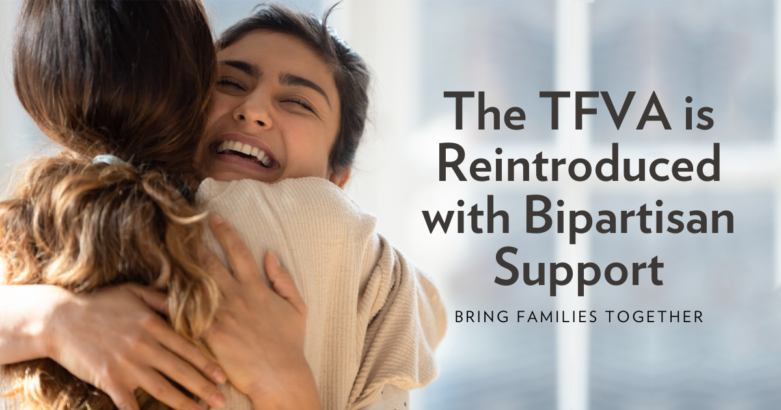PAAIA Press Release | July 25, 2023
FOR IMMEDIATE RELEASE:
Contact: Shannon Kuehn
Position: Director of Communications, PAAIA
Email: Shannon@paaia.org
Phone: (202) 828-8370
Washington, D.C. — The Public Affairs Alliance of Iranian Americans (PAAIA) welcomes the reintroduction of the Temporary Family Visitation Act (TFVA) in the House. Led by Representatives Scott Peters (D-CA), Stephanie Bice (R-OK), Jim Himes (D-CT), and Maria Elvira Salazar (R-FL), this bipartisan legislation will establish a new visa category specifically designed to allow family members of U.S. citizens and permanent residents to temporarily visit the United States.
“For years, PAAIA has spearheaded efforts to address the flaws in our nation’s visa system. Today’s reintroduction of the TFVA is a tremendous step in the right direction as we work with members of Congress to find solutions to the high visa denial rates faced by many in our community,” said PAAIA Executive Director Neda Bolourchi. “Establishing a new visa category for family members to temporarily visit the U.S. will benefit all Americans with loved ones abroad as well as boost our local economies through travel and tourism while simultaneously addressing Homeland Security issues.”
Originally introduced in the 117th Congress, the TFVA previously had 48 cosponsors and has been endorsed by 21 organizations. The bill has gathered much support among ethnic communities and the tourism industry as it not only embodies the principle of family reunion but also has the potential to bring in billions of dollars and create millions of jobs. In fact, the U.S. Travel Association estimates that each overseas traveler spends approximately $4,300 when they visit the U.S. and in 2018, international travel spending directly supported 1.2 million U.S. jobs.
Currently, family members wishing to visit their relatives in the U.S. must do so through B-2 visitor visas under the Immigration and Nationality Act (INA). Unfortunately, B-2 visitor visa applicants face unnecessarily high denial rates due to the presumption that applicants with family in the U.S. intend to immigrate. In response, many end up applying for immigrant visas as the only path to visit their loved ones in the U.S.
The TFVA addresses this issue by creating a new B-3 nonimmigrant visa category specifically allowing U.S. citizens and permanent residents to petition for their relatives to visit them in the United States. The bill requires petitioners to sign a letter of financial support and mandates that applicants make specific and realistic plans and purchase travel medical insurance. To dissuade visa overstays, the TFVA prevents visitors from changing their visa status, limits the duration of the stay to 90 days, and prohibits petitioners from using the TFVA if they had a relative that previously overstayed their visa.
“PAAIA takes immense pride in its leadership role in driving the introduction of TFVA, a transformative piece of legislation that stands to positively impact American families, businesses, and communities,” said Bolourchi. “PAAIA remains dedicated to advancing the interests of the Iranian American community and advocating for the unification of families through secure, enhanced visa policies.”
PAAIA would like to thank Atoosa Vakili, Esq. and Ali Rahnama, Esq. for their counsel and assistance in helping draft TFVA.
